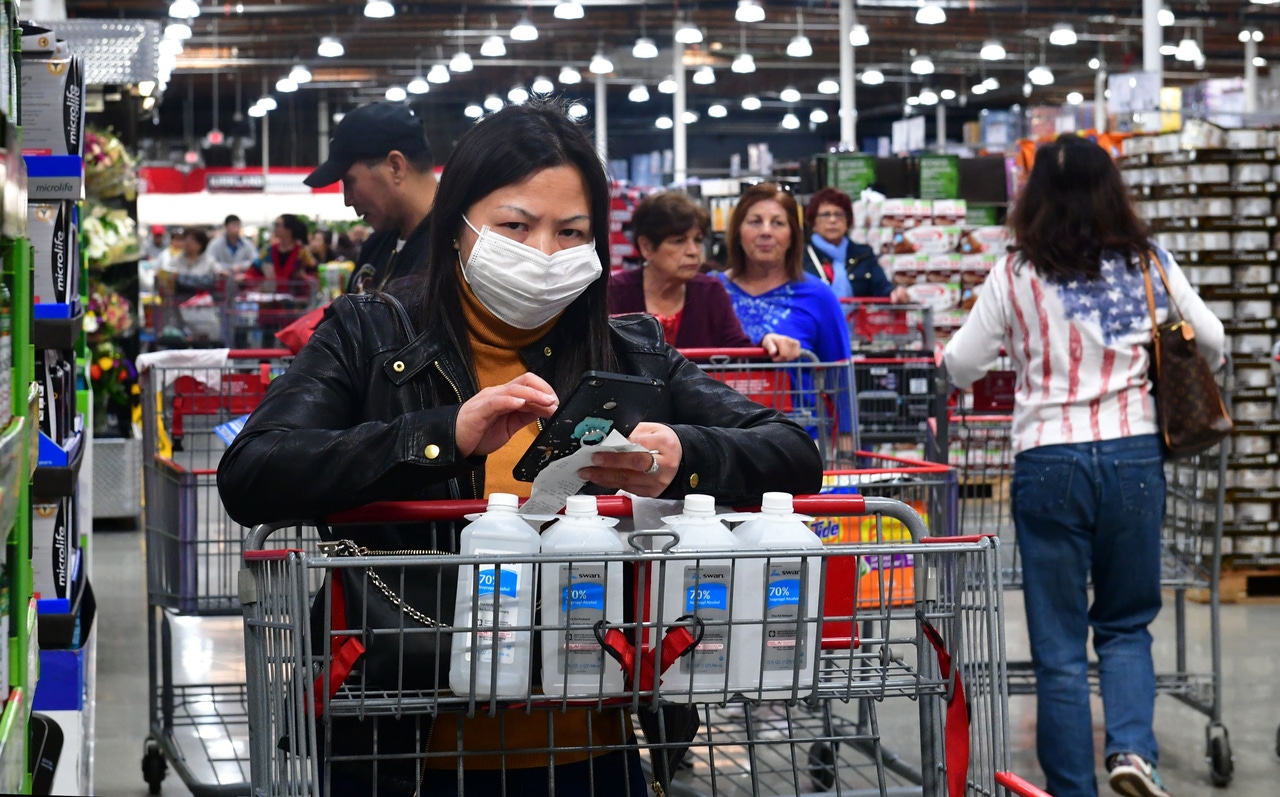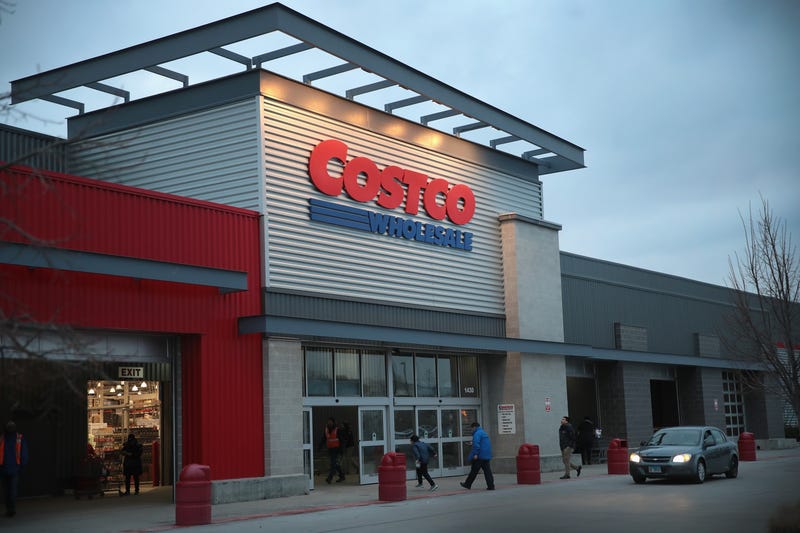Costco sales jump in Q2, with coronavirus fears lifting February resultsCostco sales jump in Q2, with coronavirus fears lifting February results
CFO Richard Galanti: ‘At this point, it’s hard to quantify what the financial impact will be’
March 6, 2020

Sales surged by double digits at Costco Wholesale in the fiscal 2020 second quarter, including strong comparable-sales gains that ballooned toward the end of February as consumers flocked to stores to stock up on coronavirus-related supplies.
For the 12 weeks ended Feb. 16, net sales climbed 10.5% to $38.26 billion from $34.63 billion a year earlier, Costco reported late Thursday. Membership fee income grew 6.3% to $816 million.
Overall comparable sales rose 8.9% in the second quarter, reflecting increases of 9.1% in the United States, 8.9% in Canada and 7.9% internationally.
Excluding the impact of fuel price changes and foreign exchange, comp sales were up 7.9%, including 8.1% in the U.S., 6.8% in Canada and 7.1% internationally.
E-commerce sales grew 28.4% year over year in the quarter and were up 28% on an adjusted basis (excluding foreign exchange).
Costco said sales got lift from the Thanksgiving holiday coming a week later in 2019. The uptick was about 0.5% for net and comp sales and 11 percentage points for e-commerce sales.

“Overall, a few of the stronger departments — majors, special or kiosk items, seasonal and toys, and housewares — generally benefited from the holiday shift,” Chief Financial Officer Richard Galanti (left) told analysts yesterday in a conference call after the market close. “In terms of total online grocery, that continues to grow at a faster rate than the store e-comm comp, both two-day and Instacart, the latter of which isn't included in our e-commerce numbers since they come into the warehouse to buy. Although the sales penetration is still very small, the sales are quite large, [with growth] in the high double-digit range year over year.”
Coronavirus fears boost February sales
For the four weeks ended March 1, covering the February sales period, Costco totaled net sales of $12.20 billion, up 13.8% from $10.72 billion a year ago.
Comparable sales jumped 12.1% overall versus a year ago, with gains of 12.4% in the U.S., 10.2% in Canada and 12.5% internationally. E-commerce sales climbed 22.6%. Adjusted for fuel and foreign exchange, comp sales rose 11.7% companywide and 11.6% in the U.S., 10.4% in Canada and 13.5% internationally.
“Our February results benefited from last week’s big uptick in sales, the fourth week of last month — mostly, we believe, related to concerns around the coronavirus. This positively impacted total and comparable sales numbers by approximately 3 percentage points,” Galanti said in the call. “U.S. regions with a strong sales results in February were the Northwest, Texas and the Midwest. Internationally, in local currencies, we saw strong results in Taiwan, Japan, Spain and Mexico.”
By merchandise category, food and sundries saw growth in the low teens, with the strongest departments including food, frozen food, sundries and candy, he said. Hardlines had gains in the high single digits, led by lawn and garden, health and beauty aids and tires. Softlines rose in the mid-single digits, with highlights including housewares, domestics and jewelry. He noted that fresh foods were up in the low double digits, fueled by meat and produce. The average transaction in February grew 2.7%.
Comparable traffic in February escalated 9.2% worldwide and 8.9% in the U.S. Galanti noted that the traffic increase stood at 7.6% worldwide for the first three weeks before jumping to 9.2% at the end of the period. “So still a good showing prior to that,” he said. In the U.S., the traffic growth was 6.9% for the first three weeks.
“We saw strength in our February traffic and comp sales related to the news and concerns about the virus, most particularly in the last week of the month, and that's continuing in the first few days of this week. Our warehouses have overall remained open, with only a few total days of closures at a couple of locations in Korea. As well our Shanghai location, there has been some limitations required on the number of people in the facility at any given time,” Galanti told analysts.
“Members are turning to us for a variety of items associated with preparing for and dealing with the virus, such as shelf-stable, dry grocery items; cleaning supplies, Clorox and bleach; water; paper goods; hand sanitizers; sanitizing wipes; disinfectants; health and beauty aids; and even items like water filtration and food storage items,” he explained. “And we're doing our best to stay in stock on these and other items. We’re getting deliveries daily but still not enough given the increased levels of demand on certain key items. It’s been a little crazy this past week in terms of outside shopping frequency and sales levels’ and not only in the United States.
“In terms of placing quantity limits on what a member can purchase, we are doing that in some instances. It tends to be at all locations but may differ regionally based on supply levels,” Galanti said. He later added, “We’re finding other ways to handle any potential out-of-stocks by shifting SKUs to alternative items and categories, particularly in the areas of domestic goods, food and sundries, and fresh.”

Costco's February results benefited from a big uptick in sales during the fourth week of last month — mostly, the company believes, related to concerns around coronavirus.
Costco operates 785 warehouse clubs overall, including 546 in the United States and Puerto Rico, 100 in Canada, 39 in Mexico, 29 in the United Kingdom, 26 in Japan, 16 in Korea, 13 in Taiwan, 11 in Australia, two in Spain, and one apiece in Iceland, France and China. Costco also operates e-commerce sites in the U.S., Canada, the U.K., Mexico, Korea, Taiwan, Japan and Australia.
Earnings beat Wall Street’s forecast; first-half sales climb
In the second quarter, reported net income came in at $931 million, or $2.10 per diluted share, compared with $889 million, or $2.01 per diluted share, a year ago.
Analysts, on average, had projected net earnings per share of $2.07, with estimates ranging from a low of $1.98 to a high of $2.16, according to Refinitiv/Thomson Reuters.
For the first half of fiscal 2020, net earnings for the 24-week period were $1.77 billion, or $4.00 per diluted share, versus $1.66 billion, or $3.74 per diluted share, a year earlier.
Net sales in the 24 weeks rose 8.1% to $74.49 billion. Including the full February reporting period, 26-week net sales totaled $80.76 billion, up 8.5% from the prior-year period.
Comp sales for the 24 weeks grew 6.6% overall and 7% in the U.S., 5.8% in Canada and 5.5% internationally. E-commerce sales were up 17.4%. For the 26-week period, total comps increased 7.2% and were up 7.5% in the U.S., 6.2% in Canada and 6.1% internationally, with e-commerce gaining 17.9%.
“At this point, it’s hard to quantify what the financial impact will be to our future results,” Galanti said, referring to the potential business impact of the coronavirus outbreak. “Again, the first week-and-a-half of this fiscal quarter, it's been quite good with sales. But we’ll see what tomorrow brings.”
For our most up-to-date coverage, visit the coronavirus homepage.
About the Author
You May Also Like





.webp?width=300&auto=webp&quality=80&disable=upscale)
